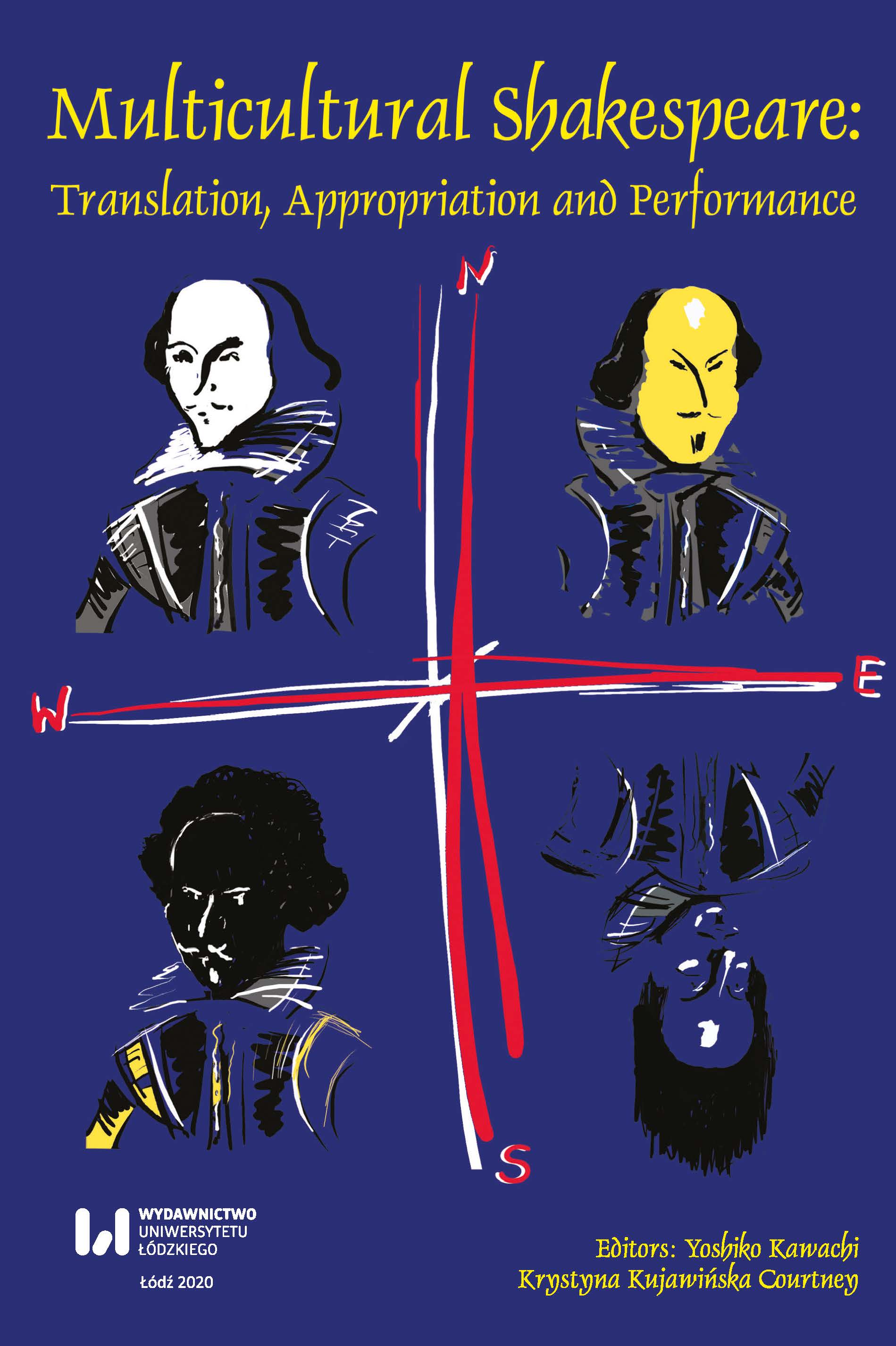Othello and the Ambivalences of Italian Blackface
DOI:
https://doi.org/10.18778/2083-8530.22.05Keywords:
Othello, Shakespeare in Italy, blackface, colonialism, postcolonialism, fascism, film, adaptations, popular cultureAbstract
Blackface is a cultural practice that appears ubiquitously in Italian history cutting across the political spectrum; it also lends itself to suprising anti-racist actions. This essay examines the use of blackface from the nineteenth to the twenty-first century by looking at its appearance in popular culture and, contextually and dialectically, at its adoption in selected performances of Othello, a play that holds special meaning in Italy because of its famous operatic adaptations. Africa and blackness were often represented in Italian visual arts in the early modern period, but the early colonial ventures of the new independent Italy create a new exotic imaginary that is particularly manifest in popular culture. Othello is influenced by new African discourses but it allso exists in a parallel dimension that somehow resists facile political interpretations. The colonial ventures of post-unification and Fascist Italy do not reverberate in any predictable manner in the growing popularity of the play. After World War II new forms of exoticism emerge that will be subverted only by a new postcolonial scenario that also coincides with a re-emergence of racism. Against the respective historical backdrops, we examine the idiosyncratic versions of blackface by Tommaso Salvini, Pietro Sharoff, Pier Paolo Pasolini, Carmelo Bene, and Elio De Capitani to suggest continuities and discontinuities in Italian interpretations of Othello.
Downloads
References
Abbattista, Guido. “Dagli Ottentotti agli Assabesi. Preambolo a una ricerca sulle esposizioni etniche in Italia nel sec. XIX”, in Studi in onore di Giovanni Miccoli, Trieste: Edizioni Università di Trieste, 2004, 275-294.
Google Scholar
Bartalotta, Gianfranco. Carmelo Bene e Shakespeare. Roma, Bulzoni, 2000.
Google Scholar
Bassi, Shaul. “Barefoot to Palestine: the Failed Meetings of Shylock and Othello”, in Visions of Venice in Shakespeare, eds. Laura Tosi and Shaul Bassi, Aldershot: Ashgate, 2011.
Google Scholar
Bene, Carmelo. Otello o la deficienza della donna. Milano: Feltrinelli, 1981.
Google Scholar
Bene, Carmelo. Otello. Film. Rai, 2001. https://www.youtube.com/watch?v=qq5AtC0wsx4 20 march 2020.
Google Scholar
Bene, Carmelo, Giancarlo Dotto. Vita di Carmelo Bene. Milano: Bompiani, 1998.
Google Scholar
Ben-Ghiat, Ruth. Italian Fascism’s Empire Cinema. Bloomington: Indiana University Press, 2015.
Google Scholar
Caponi, Paolo. Otello in camicia nera: Shakespeare, la censura e la regia nel ventennio fascista. Roma: Bulzoni, 2018.
Google Scholar
Croce, Benedetto. Shakespeare. Bari: Laterza, 1925.
Google Scholar
Domenici, Viviano. Uomini nelle gabbie. Dagli zoo umani delle expo al razzismo della vacanza etnica. Milano: Il Saggiatore, 2015.
Google Scholar
Fambri, Paulo. L’amore di tre barbari. Padova: Fratelli Salmin, 1884.
Google Scholar
Gilroy, Paul. Between Camps: Nations, Cultures and the Allure of Race. New York: Routledge, 2013.
Google Scholar
DOI: https://doi.org/10.4324/9780203639580
Giuliani, Gaia and Lombardi Diop, Cristina. Bianco e nero. Storia dell’identità razziale degli italiani. Milano: Mondadori, 2013.
Google Scholar
Jarro [Giulio Piccini]. L’Otello di Guglielmo Shakespeare. Firenze: Le Monnier, 1888.
Google Scholar
Kaplan, Paul. “Italy, 1490-1700” in The Image of the Black in Western Art, vol. 3, part 1, eds. Henry Louis Gates, Jr., and David Bindman, Cambridge, MA: Belknap Press of Harvard University Press, 2010, 93-190, 347-367.
Google Scholar
L.[?]D.[?] ‘Un’interpretazione razzista dell’Otello,’ La difesa della razza 3, no. 24, 20 October 1940.
Google Scholar
Massai, Sonia. “Subjection and Redemption in Pasolini’s Othello”, in World-Wide Shakespeares: Local Appropriations in Film and Performance, ed. Sonia Massai, New York: Routledge, 2005.
Google Scholar
Mayer, Catherine and Stephan Faris. “Why Always Mario?”, Time Magazine, Nov. 12, 2012 http://content.time.com/time/magazine/article/0,9171,2128258-2,00.html (accessed 25 March 2020).
Google Scholar
Neill, Michael. ‘Introduction,’ in William Shakespeare, Othello. Oxford: Oxford University Press, 2006.
Google Scholar
O’Healy, Áine. “‘[Non] è una somala’: Deconstructing African femininity in Italian film.” the italianist 29.2, 2009: 175-198.
Google Scholar
DOI: https://doi.org/10.1179/026143409X12488561926306
Pasolini, Pier Paolo. “Che cosa sono le nuvole?”, Per il Cinema, Vol. 1., eds. Walter Siti and Franco Zabagli, Milano: Meridiani Mondadori, 2001, 932-966.
Google Scholar
Pasolini, Pier Paolo. “Il padre selvaggio”, Per il Cinema, Vol. 1, eds. Walter Siti and Franco Zabagli, Milano: Meridiani Mondadori, 2001, 265-325.
Google Scholar
Pisanty, Valentina. La difesa della razza. Antologia 1938-1943. Milano: Bompiani, 2006.
Google Scholar
Said, Edward. Culture and Imperialism. New York: Chatto & Windus, 1993.
Google Scholar
Salvini, Tommaso. Aneddoti, ricordi, impressioni, Milano: Fratelli Dumolard, 1895.
Google Scholar
Scarpa, Laura (ed.). Le storie Nere del Corriere dei Piccoli. Il colonialismo italiano del primo 900 a fumetti, Roma: Comicout, 2019.
Google Scholar
Scego Igiaba et al. Pecore nere: Racconti. Bari: Laterza 2006.
Google Scholar
“Signor Salvini”, Illustrated London News, 17 April 1875, 368.
Google Scholar
Srivastava, Neelam. Italian Colonialism and Resistances to Empire, 1930-1970. London: Palgrave Macmillan, 2018.
Google Scholar
DOI: https://doi.org/10.1057/978-1-137-46584-9
Trento, Giovanna. Pasolini e l’Africa. L’Africa di Pasolini, Roma: Mimesis Edizioni, 2015.
Google Scholar
Trento, Giovanna. “Pier Paolo Pasolini and Pan-Meridional Italianness.” The Scandal of Self-Contradiction: Pasolini’s Multistable Subjectivities, Traditions, Geographies, eds. Di Blasi, Luca, Manuele Gragnolati, and Christoph FE Holzhey. New York: Routledge, 2012, 59-83.
Google Scholar
DOI: https://doi.org/10.37050/ci-06_04
Veggetti Kanku, Luigi Christopher. Salvini Nero. https://salvininero.com/salvini-nero-asta-indipendente/ 25 March 2020.
Google Scholar
Vittori, Giulia and Francesco Chillemi. “Disseminating Bene in the Anglosphere”, Mimesis Journal 5, 1, 2016, URL : http://mimesis.revues.org/1115 25 March 2020.
Google Scholar
DOI: https://doi.org/10.4000/mimesis.1115
Downloads
Published
How to Cite
Issue
Section
License

This work is licensed under a Creative Commons Attribution-NonCommercial-NoDerivatives 4.0 International License.












